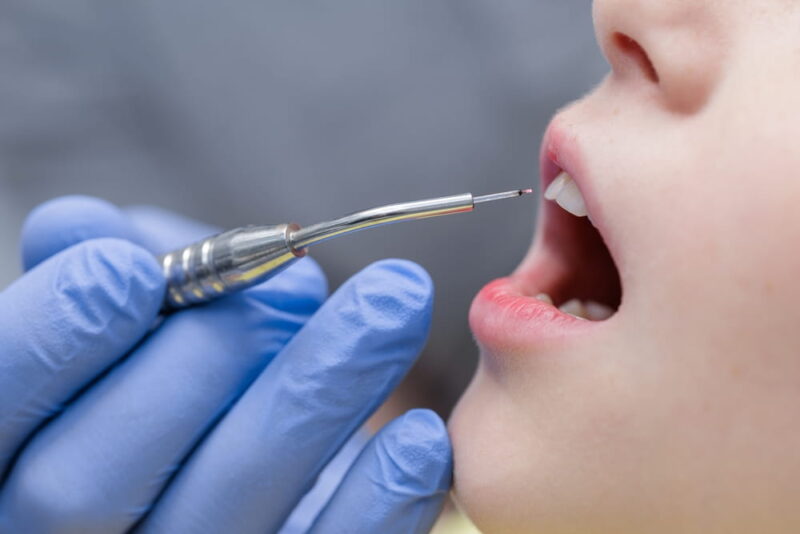When it comes to dental health, there’s a subject of universal concern – cavities. These tiny yet impactful dental issues can lead to discomfort and long-term problems if left unaddressed. In this blog from Aloe Dental Wellness in Goleta, we’ll dive into the intricate process of cavity formation, explore the anatomy of a tooth, and discuss practical strategies for preventing these dental concerns.
What Is The Anatomy Of A Tooth?
Understanding the formation of cavities starts with grasping the basic anatomy of a tooth. Teeth are complex structures composed of various layers, each playing a vital role in maintaining their structural integrity.
- Enamel: Acting as the outermost layer, enamel serves as the protective shield of a tooth. Made up primarily of minerals like hydroxyapatite, enamel is resilient but vulnerable to erosion when exposed to acidic substances and poor oral hygiene.
- Dentin: Below the enamel lies dentin, a softer and porous tissue that contains tiny tubules connecting to the nerve center of the tooth, known as the pulp. Enamel erosion can lead to dentin exposure, causing sensitivity and discomfort.
- Pulp: The core of the tooth, pulp, houses blood vessels, nerves, and connective tissues. Any breach in the enamel and dentin allows bacteria to infiltrate the pulp, resulting in inflammation, pain, and potential infection.
The Cavity Formation Process:
Cavities, scientifically known as dental caries, result from a complex interaction involving bacteria, carbohydrates, and tooth structure. The process unfolds in several stages:
1. Plaque Formation: Our mouths host a diverse microbial community, and when we consume sugars and starches, bacteria feed on these carbohydrates, producing plaque – a sticky film that adheres to the tooth’s surface.
2. Acid Production: Bacteria in plaque metabolize sugars, producing acid as a byproduct. This acid lowers the oral pH, creating an acidic environment that gradually erodes enamel over time.
3. Enamel Demineralization: The acid weakens the minerals in the enamel, leading to demineralization. At this stage, the enamel surface may appear intact, but microscopic changes are occurring, setting the stage for cavity development.
4. Cavity Formation: As demineralization progresses, the enamel breaks down, forming a cavity. Once the cavity penetrates the dentin, the process accelerates, compromising the tooth’s structural integrity.
Can Untreated Cavities Cause Other Health Problems?
Untreated cavities can give rise to a range of serious health issues with implications beyond oral health. Initially, the decay process may lead to persistent pain, tooth sensitivity, and difficulty chewing or speaking. As cavities progress, they can extend into the pulp of the tooth, leading to painful abscesses or infections. If these infections are left unchecked, they have the potential to spread to surrounding tissues, causing facial swelling and even systemic complications. Beyond the immediate oral consequences, untreated dental issues can contribute to broader health concerns.
Chronic oral infections may be associated with cardiovascular problems, as bacteria from the mouth can enter the bloodstream, potentially contributing to inflammation and impacting heart health. Research also suggests potential links between poor oral health and conditions such as diabetes and respiratory diseases, underscoring the systemic impact of neglected dental care. Timely intervention through regular dental check-ups and preventive measures is crucial to curbing the progression of cavities and minimizing associated health risks.
How To Prevent Cavities
- Maintain Good Oral Hygiene: Regular brushing and flossing form the foundation of cavity prevention by removing plaque and maintaining oral cleanliness.
- Limit Sugar Intake: Since bacteria thrive on sugars, reducing sugar consumption can limit plaque formation. Be mindful of hidden sugars in processed foods and beverages.
- Fluoride: Incorporate fluoride toothpaste and consider fluoride treatments, as fluoride strengthens enamel and provides an additional layer of protection.
- Regular Dental Check-ups: Professional dental cleanings and check-ups are essential for early detection and intervention. Dentists can offer personalized advice and address emerging issues promptly.
By understanding the intricate process of cavity formation and adopting proactive measures, we empower ourselves to maintain healthy, resilient smiles.
Supporting Children and Good Dental Hygiene Habits
Helping children establish good dental hygiene practices is not just about safeguarding their immediate oral health; it’s an investment in their long-term well-being. Children often lack the manual dexterity and understanding to perform thorough oral care independently, making parental guidance crucial. By actively participating in their children’s dental routines, parents ensure that proper techniques are learned and reinforced. This early involvement lays the groundwork for a lifetime of healthy habits, reducing the likelihood of dental issues and associated health complications. Moreover, fostering a positive attitude towards dental care at a young age sets the stage for a proactive approach to overall health, emphasizing the interconnectedness of oral health with the broader spectrum of well-being.
Choose Aloe Dental Wellness For All Your Dentistry Needs
At Aloe Dental Wellness, you can expect the very best in dental care with Dr. Daniela Cadavid. Before your appointment, you can expect to enjoy soothing music and fresh coffee, tea, and water in our relaxing patient lounge. Our office is a child-friendly, family-oriented environment, and we pride ourselves on the ability to make patients of all ages comfortable.
Dr. Cadavid is glad to offer a brand-new office equipped with the latest technology and services in both English and Spanish to UCSB students and staff, as well as the surrounding communities. Aloe Dental Wellness in Santa Barbara County is proud to provide general, cosmetic, and emergency dentistry services to meet the needs of your entire family as well. For an appointment, call us at 805-454-7727 today.




